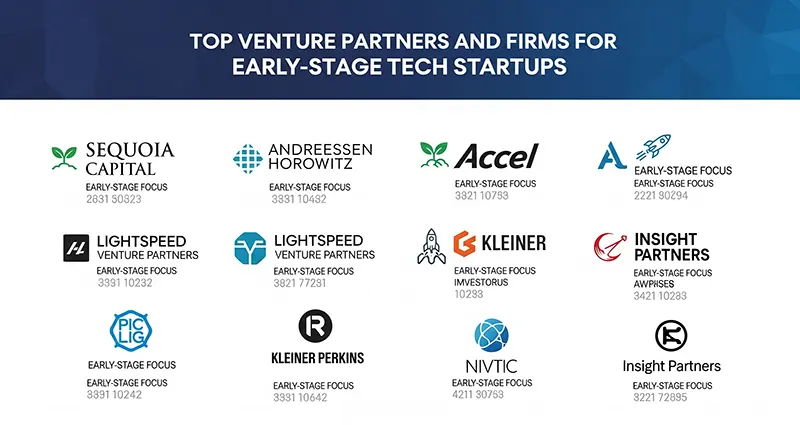Top Venture Partners and Firms for Early-Stage Tech Startups
When a startup seeks venture capital, it’s not just about the money; it’s about finding a venture partner who brings strategic value, network connections, and hands-on expertise. The right partner can be the difference between a company that merely survives and one that dominates its market. While the venture capital landscape is vast, certain partners and firms have established themselves as leaders in supporting early-stage tech startups. Here are some of the top venture partners and firms known for their success in this space.
These firms are known for identifying and nurturing innovative companies from their earliest stages, often with a deep focus on specific sectors like AI, SaaS, fintech, and more.
Andreessen Horowitz (a16z)
Andreessen Horowitz, or a16z, is a dominant force in Silicon Valley. The firm is known for its “all-in” approach, providing startups with extensive support beyond just capital, including operational advice, recruiting services, and a powerful network. They have a strong reputation for backing transformative companies in areas like AI, cryptocurrency, and enterprise software. A16z’s partners are often former founders and executives, bringing firsthand experience to the table.
Sequoia Capital
One of the most legendary names in venture capital, Sequoia Capital has an unparalleled track record of backing generation-defining companies from their infancy, including Apple, Google, and Airbnb. While a global firm, its early-stage teams are known for their founder-friendly approach and ability to spot high-potential startups before they become obvious successes. They focus on providing founders with the guidance and resources to build enduring … READ MORE ...
Why Backing Up Data on Your Dedicated Server Is Important and How to Do It?
If you want to purchase a dedicated server or already have one, you must understand the importance of data backup.
Data is one of the most powerful yet most fragile components of the digital world. Most security measures and tools work towards data protection, and everything is a waste if you do not back up your data.
In this blog, we explore why your dedicated server needs backup and how to do it!
Data Backup on a Dedicated Server
Every hosting user is warned about a security threat or two when using web hosting in India and around the world, and data loss is one of them. It is crucial to leverage data backups in order to protect your dedicated server storage and data.
A backup refers to the process of creating and storing copies of data from your dedicated server. Ideally, the best providers offer digital, physical, on-site and remote dedicated server storage. It safeguards the data against loss due to unforeseen circumstances like hardware failure, data breach, data theft, downtime and human error.
Importance of Dedicated Server Backup Protocol
- Data loss can happen due to a security breach, theft, hardware failure, software malfunction and human errors. However, if you do not have a backup and recovery plan, you will be at a loss. Regular dedicated server backup solutions ensure you can restore your server to a functional state quickly.
- With the rise of ransomware and other cyber threats, dedicated server backup solutions serve as a fallback to recovery
How To Purchase a Domain Name Anonymously?
There are several legitimate reasons why a website owner might buy a domain name anonymously. A domain name is a very important aspect of your website as it drives your audience to it.
Similar to your home address, it acts like your online address and guides your audience to your website. Some of the common reasons to buy a domain name anonymously can be privacy protection, business confidentiality, security concerns, etc.
So, if you want to buy a domain name anonymously and not from a domain hosting service, keep reading.
How To Purchase a Domain Name Anonymously?
1. Auction
Purchasing a domain name through an auction is the best way to stay anonymous. They work almost the same as traditional online marketplaces where sellers list and buyers by browsing and bidding on them.
The only difference you will find between them is that domain auctions are exclusively for selling and buying the domain. You can avoid conveying your personal details with third parties and get your required domain stress-free.
2. Domain Broker
When you want to buy a domain anonymously, no one is better than traditional domain brokers. They are professionals and offer a sophisticated layer of privacy. They work like a safety shield between you and the domain seller, ensuring that your identity stays sealed through the domain buying process.
They use their credentials or hire privacy services, ensuring your identity stays anonymous. They can also eliminate related financial trails that can lead to you.
3. Domain Marketplace
… READ MORE ...The Best Angel Investors for Tech Startups in 2025: A Guide for Founders
Securing early-stage funding is a critical step for any tech startup aiming to disrupt its industry. While venture capital firms often get the spotlight, angel investors—high-net-worth individuals who provide capital for a startup in exchange for ownership equity—are the lifeblood of the early-stage ecosystem. In 2025, a new wave of investors, alongside seasoned veterans, are actively seeking the next generation of groundbreaking tech companies.
This article highlights some of the most influential and active angel investors for tech startups in 2025 and provides insights on how to connect with them.
The Top Tech Angel Investors to Watch in 2025
The landscape of angel investing is constantly evolving, but certain names consistently rise to the top due to their successful track record, expertise, and strategic value. Here are some of the most prominent angel investors in the tech space this year:
1. Naval Ravikant
* Known For: Co-founder of AngelList, an influential platform that has revolutionized startup fundraising.
* Investment Focus: Ravikant is a thought leader and a highly active investor with a keen eye for innovative companies. His portfolio includes some of the biggest names in tech, like Uber, Twitter, and Postmates. He’s also known for his deep insights into the tech industry and alternative funding models.
2. Alexis Ohanian
* Known For: Co-founder of Reddit and founder of Seven Seven Six.
* Investment Focus: Ohanian is a highly respected entrepreneur and investor who brings a founder-first perspective. He actively supports startups across a variety of tech sectors and is … READ MORE ...
The Best Ways to Disclose Repair History When Selling Your Car Online in Columbus GA
Do you ever wonder how much repair history matters when selling your car online? For potential buyers, it’s often one of the first questions they’ll ask. While you might be tempted to downplay past issues, honesty is your greatest asset when selling cars online in Columbus GA. Sharing repair history not only builds trust but also sets realistic expectations for buyers, making the entire transaction smoother. If you’re thinking, “How do I approach this without scaring buyers off?” you’re in the right place. This guide will show you the best ways to disclose your car’s repair history so you can confidently sell your car online in Columbus GA.
Be Honest About Past Repairs to Build Buyer Trust
Transparency is key when selling cars online in Columbus GA. Buyers appreciate knowing what they’re getting, and being upfront about any major repairs can work in your favor. Honesty shows you’re not trying to hide anything and helps create a foundation of trust.
Start by listing significant repairs in a clear, straightforward way. For example, if you replaced the transmission two years ago or fixed a cracked radiator, include those details in your car’s description. Avoid using overly technical language; just explain what was repaired and why. Buyers who trust you are more likely to move forward with the purchase, even if the car has a few blemishes in its history.
Share Documentation of Recent Maintenance Work
One of the most effective ways to assure buyers is to back up your … READ MORE ...













